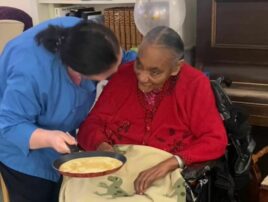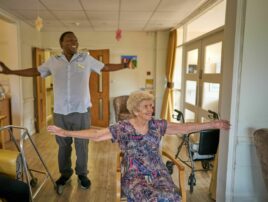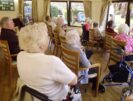
Tuesday 5th October 2021
The special gift of Christmas for people living with dementia
Louise Morse
It’s beginning to look a lot like Christmas! Supermarket shelves are full of all things Christmassy, and Sainsbury’s is handing out its Christmas food order forms. After months of separation in the pandemic, friends and families are looking forward to getting together and celebrating a great Christmas this year, one that includes being together live again in ‘real’ church services, instead of online. And celebrating Christmas can bring a special gift to people living with dementia.
One of the greatest gifts is the way the Holy Spirit magnifies our sense of wonder at Christmas time. We marvel again that God gave His only Son, the co-creator of the universe (Colossians 1:16) to be born as a human baby and ultimately, become our Saviour. Dementia affects the brain and cognition, but it doesn’t touch the soul and the spirit of a person, and at Christmas time, especially, the Holy Spirit is released through our worship and spiritual songs and speaks directly to our innermost being. Deep calls to deep (Psalm 42:7), and we are ‘strangely warmed’ as John Wesley described it. It’s as the first verse of ‘O Holy Night’ sings, ‘Long lay the world in sin and error pining, till He appeared and the soul felt its worth.’
These touches can also prompt ‘rementing’ when the person emerges through the fog with faculties that they had apparently lost. It can happen at other times of the year, but there are so much more stimuli at Christmas, with its church services, worship, and Scripture readings. There’s the whole atmosphere and joy of it, too, as families and friends come together after the long months of separation during the pandemic.
There may be signs of dementia among older relatives you haven’t seen for a while. Experts predict a rise in diagnoses, because the feelings of loneliness felt during the pandemic increase vulnerability to the disease. Or you may just be seeing signs of mild cognitive impairment (MCI), a condition that again, can be brought on by stress and loneliness. Whether it’s dementia or MCI they will enjoy the time better if their sensory input is not overloaded. A comfy chair in the corner, with a little side table for a cup of tea and a mince pie is better than in the centre of a crowded room with high noise levels.
One of the best examples of including someone with a disability without putting them under pressure happened around a hospital bed. Marie, in her late 60s, was recovering after major surgery. She had a large family of six children, and one evening they came into the hospital and, after greeting her with a careful hug, found some chairs and sat around her bed and chatted amongst themselves, with an occasional word or nod to her. She clearly felt part of the family but wasn’t expected to make an effort to join in, although she did a few times. She was just happy to have them there and see them being family. ach of them brought a little gift and put it on her bedside locker, which made it look like Christmas.
You can also like Brain & Soul Boosting for Seniors (BSBS) at Christmas time. These are a few sessions written to engage people in a cognitive therapy that does what it says in the title. The Christmas version is suitable for a small group or for a couple.
But for people with dementia, as for all of us, it’s the love of the family and friends; the kindness and warmth, the carols and worship that makes it, as another Christmas song says, ‘the most wonderful time of the year!’
More about dementia

Dementia Information Pack >
A series of leaflets on different aspects of dementia, including diagnosis, caring, managing challenging behaviour, caring for the caregiver, and much more....

Dementia From The Inside >
As a doctor and a Christian diagnosed with dementia, Jennifer uses her story and others to give practical and spiritual direction to others with dementia and their families.

































